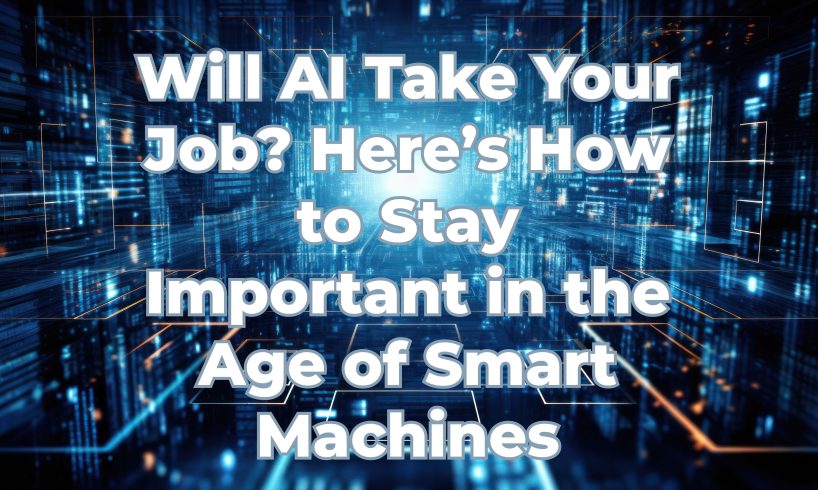
Introduction
Are you worried that robots and computers might take over your job? You’re not alone. With AI getting smarter every day, a lot of people are wondering what will happen to their jobs. But don’t worry! There are ways to make sure you stay important and valuable, even as technology changes. Let’s talk about how you can do that.
What is AI and How Does it Work?
First, let’s understand what AI (Artificial Intelligence) is. AI is a kind of computer technology that can think and learn like humans. There are many kinds of AI, from simple ones that recommend movies on Netflix to complex ones that can drive cars or diagnose diseases. The smartest ones, called Generative AI (Gen AI), can create new things like pictures, music, or even write stories!
Why People Are Afraid of AI Taking Their Jobs
People worry that if computers can think and learn, they might do our jobs better and faster. This could mean fewer jobs for people. For example, if a computer can write news articles quickly, what happens to writers? If robots can build cars, what happens to factory workers? It’s a scary thought, but it’s important to remember that this isn’t the whole story.
How AI Can Be Your Friend, Not Your Enemy
Instead of seeing AI as a threat, think of it as a helper. AI can take over boring, repetitive tasks, leaving you more time to do creative and interesting work. Here’s how you can make AI your friend:
- Learn About AI: Understanding AI will help you see how it can help you in your job. There are many free resources online where you can learn about AI basics.
- Work with AI: Find ways AI can make your job easier. For example, if you’re a writer, use AI to check your grammar or find interesting topics to write about.
- Stay Curious: Always be willing to learn new things. The more skills you have, the more valuable you become. Take classes, read books, or watch videos about the latest trends in your field.
Skills That Will Always Be Important
No matter how smart computers get, there are some skills that only humans have. Here are a few:
- Creativity: AI can help create things, but it still needs human ideas to get started. Your imagination is unique and valuable.
- Empathy: Understanding and caring about other people is something AI can’t do. Jobs that require personal connections, like nursing or teaching, will always need humans.
- Problem-Solving: AI can follow rules and patterns, but humans are better at thinking outside the box. Your ability to come up with new solutions is key.
- Leadership: People look to leaders for guidance and inspiration. Good leadership involves emotions and human connections, which AI can’t replicate.
Jobs That Are Safe from AI
Some jobs are more likely to stay around, even as AI gets smarter. Here are a few examples:
- Healthcare: Doctors, nurses, and therapists need to understand and care for patients in ways AI can’t.
- Education: Teachers do more than just share facts. They inspire and guide students, something AI can’t do.
- Creative Arts: Artists, musicians, and writers bring unique human experiences to their work that AI can’t match.
- Trades: Jobs like electricians, plumbers, and carpenters require hands-on skills and problem-solving on the spot.
How to Prepare for the Future
It’s important to be ready for changes. Here are some tips to help you prepare:
- Keep Learning: Take classes, learn new skills, and stay up-to-date with technology. This will make you more adaptable to changes.
- Network: Build relationships with people in your industry. Connections can help you find new opportunities and stay informed about job trends.
- Be Flexible: Be open to changing your career path. The job you have today might not exist in the future, but that doesn’t mean you can’t find a new, exciting job.
- Think Big Picture: Focus on skills that are useful in many different jobs, like communication, teamwork, and critical thinking.
Keeping Your Mindset Positive
Having the right attitude is super important when thinking about the future and technology. Here are some tips to keep a positive mindset:
- Stay Positive: Instead of worrying about what might go wrong, think about all the exciting opportunities AI can bring. New jobs and ways of working will appear, and you can be part of that change.
- Be Confident: Believe in yourself and your abilities. Remember that you have unique talents and skills that are valuable.
- Embrace Change: Change can be scary, but it also brings new adventures. Try to see change as a chance to learn and grow.
- Ask for Help: If you’re feeling overwhelmed, talk to someone you trust. Friends, family, or teachers can offer support and advice.
Fun Ways to Learn About AI
Learning about AI doesn’t have to be boring. Here are some fun ways to get started:
- Games and Apps: There are many educational games and apps that teach about AI and coding. Look for ones that are fun and interactive.
- Videos and Podcasts: Watch videos or listen to podcasts that explain AI in simple terms. There are many resources made for kids that make learning fun and easy.
- DIY Projects: Try some do-it-yourself projects. Build a simple robot, create a basic program, or even try out a coding kit.
- AI in Everyday Life: Notice where AI shows up in your daily life. Ask yourself questions like, “How does this app suggest songs?” or “Why does this website show me ads for things I like?” This will help you understand AI better.
Encouraging Creativity
Since creativity is a skill that AI can’t fully replicate, it’s a good idea to develop your creative side. Here are some ways to do that:
- Try New Hobbies: Pick up a new hobby like drawing, writing, or playing an instrument. These activities help boost your creativity.
- Solve Puzzles: Doing puzzles and brainteasers can help you think creatively and solve problems in new ways.
- Collaborate with Others: Work on group projects or team activities. Collaborating with others can spark new ideas and solutions.
- Keep a Journal: Writing down your thoughts and ideas can help you think more creatively. You might come up with new inventions or solutions to problems.
Helping Others Understand AI
Once you start learning about AI, you can help others understand it too. Here’s how:
- Share What You Know: Talk to your friends and family about what you’ve learned. Explain how AI works and how it can help in daily life.
- Teach a Class: If you’re really excited about AI, see if you can give a presentation at school. Teaching others is a great way to solidify your own understanding.
- Start a Club: Start an AI or coding club at your school. Working with others who are interested in the same topics can be fun and educational.
Looking to the Future
The future is full of possibilities, and AI will play a big part in shaping it. Here are some final tips to keep in mind:
- Dream Big: Think about what you want to do in the future. How can you use AI to achieve your goals?
- Stay Adaptable: The world is always changing, and being flexible will help you navigate new challenges and opportunities.
- Be a Lifelong Learner: Always be curious and willing to learn. The more you know, the better prepared you’ll be for whatever comes next.
- Make a Difference: Think about how you can use AI to help others and make the world a better place. Whether it’s solving a big problem or just making someone’s day easier, you can make a positive impact.
Conclusion
Remember, AI is a tool that can help you, not something to be afraid of. By staying curious, learning new skills, and focusing on what makes you unique, you can thrive in the age of smart machines. The future is bright, and you have the power to shape it. So go out there, learn about AI, and show the world what you can do!
Featured Image Credit: Freepik






